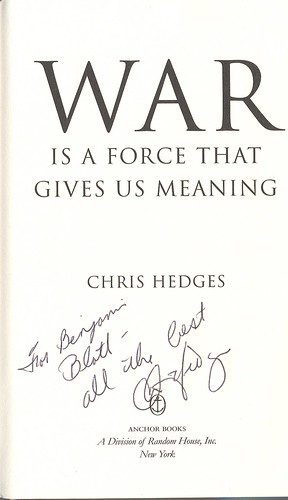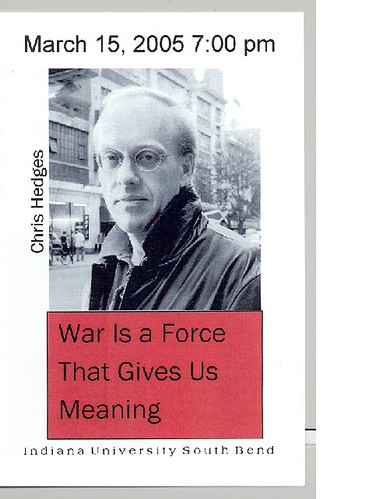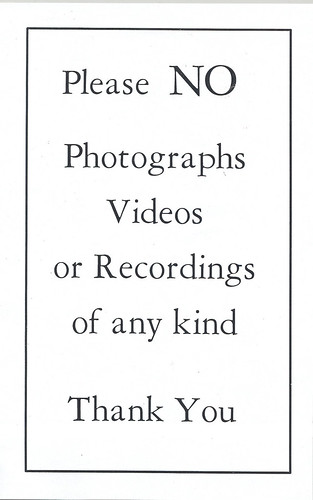Wednesday, March 16, 2005
Finally, A talk with Chris Hedges
Well, I guess there's not much to say about my talk with Chris Hedges. I asked him about Khafji, and I can sum it up as "Sound and Fury signifying nothing."
He says he was on those rooftops watching Marines retake the city, WITH Marines of the 1st Battalion of the 1st Regiment out of Camp Pendleton. I would love to hear from anyone who can verify this information.
He says he watched Marine units retake the city, that there were few Arabs involved in the operation. When I pointed out that Morris's well documented book indicates just the opposite, he professed to enjoy retrospective studies and blamed it on the fog of war i.e. limited perspective. No satisfactory answer arose when I asked him why he didn't bother to verify his information before publishing his book.
I would have gotten this all on tape, but the event form stipulated no photos or recordings. However, the scans from afterwards are worth looking at. Check out the priceless signature I got before I asked him about Khafji. It reads "For Benjamin Blatt All the Best - Chris Hedges. Neat.
I guess I'm done with Hedges, though I'd like to look into Khafji in more depth. It's quite clear he isn't going to easily admit any wrong-doing. FASTAC 6, on the other hand, is just getting started. He spent most of the time taking furious notes about Hedges statements, and nearly had a stroke in the process, if his skin coloration was anything to go by.



BTW, Hedges did say that US troops were "necropheliacs" and "professional killers." Given that US troops are trained to kill, but reservists and guardsman do their service mostly part-time, I think the second part is inaccurate. The first part of his statement is, of course, just grossly vile.
Anyway, expect some neat ranting from FASTAC 6 later.
He says he was on those rooftops watching Marines retake the city, WITH Marines of the 1st Battalion of the 1st Regiment out of Camp Pendleton. I would love to hear from anyone who can verify this information.
He says he watched Marine units retake the city, that there were few Arabs involved in the operation. When I pointed out that Morris's well documented book indicates just the opposite, he professed to enjoy retrospective studies and blamed it on the fog of war i.e. limited perspective. No satisfactory answer arose when I asked him why he didn't bother to verify his information before publishing his book.
I would have gotten this all on tape, but the event form stipulated no photos or recordings. However, the scans from afterwards are worth looking at. Check out the priceless signature I got before I asked him about Khafji. It reads "For Benjamin Blatt All the Best - Chris Hedges. Neat.
I guess I'm done with Hedges, though I'd like to look into Khafji in more depth. It's quite clear he isn't going to easily admit any wrong-doing. FASTAC 6, on the other hand, is just getting started. He spent most of the time taking furious notes about Hedges statements, and nearly had a stroke in the process, if his skin coloration was anything to go by.



BTW, Hedges did say that US troops were "necropheliacs" and "professional killers." Given that US troops are trained to kill, but reservists and guardsman do their service mostly part-time, I think the second part is inaccurate. The first part of his statement is, of course, just grossly vile.
Anyway, expect some neat ranting from FASTAC 6 later.
Comments:
<< Home
During the early paragraphs of his talk, he was reading verbatim from the opening of his December 16, 2004 article in the New York Review of Books, and you can see exactly how he uses the word necrophilia there, if you wish. The paragraphs are about war in general and make no mention of US troops.
Speaking of war in general, is there some truth to the idea that some of those who admire war do exhibit a "fascination with death"? I imagine the answer is yes. Does war push people in the direction of extreme psychological states such as that? Who could disagree with that? Did Hedges overstate, though, when he said that "war is necrophilia"? I don't know.
It is misleading, I think, to paraphrase his talk in the way your post does without at least quickly mentioning the profound respect he exhibited for various American soldiers. I recall vividly his mention of the three Marine unit leaders, Vietnam veterans, who he got to know in Kuwait -- if I am remembering the right campaign. Certainly he spoke with great respect for those men, for their hatred of war, and for their sense of duty.
In order to describe Hedges fairly, whether you like him or not, I think you have to show that he gave a detailed and complex view of his experiences. The combat veteran I know best from the audience was relieved to see that there was quite a bit of common ground between Hedges' views and his own experiences. That veteran did not feel he was dealing with a writer of propoganda, as he feared, I believe, before attending the event.
Speaking of war in general, is there some truth to the idea that some of those who admire war do exhibit a "fascination with death"? I imagine the answer is yes. Does war push people in the direction of extreme psychological states such as that? Who could disagree with that? Did Hedges overstate, though, when he said that "war is necrophilia"? I don't know.
It is misleading, I think, to paraphrase his talk in the way your post does without at least quickly mentioning the profound respect he exhibited for various American soldiers. I recall vividly his mention of the three Marine unit leaders, Vietnam veterans, who he got to know in Kuwait -- if I am remembering the right campaign. Certainly he spoke with great respect for those men, for their hatred of war, and for their sense of duty.
In order to describe Hedges fairly, whether you like him or not, I think you have to show that he gave a detailed and complex view of his experiences. The combat veteran I know best from the audience was relieved to see that there was quite a bit of common ground between Hedges' views and his own experiences. That veteran did not feel he was dealing with a writer of propoganda, as he feared, I believe, before attending the event.
>In order to describe Hedges fairly, whether you like him or not, I think you have to show that he gave a detailed and complex view of his experiences. The combat veteran I know best from the audience was relieved to see that there was quite a bit of common ground between Hedges' views and his own experiences. That veteran did not feel he was dealing with a writer of propoganda, as he feared, I believe, before attending the event.
# posted by Anonymous : 8:51 PM<
Yep. His experiences. His craziness. While most sane people do share some common responses to that level of danger & death, Hedges asserts that certain motivations and actions are universal to all participants in warfare. That is why I find him such an obnoxious fool. He talked of respect for soldiers (3) whose views were similar to his. I now regret not continuing my outburst. Perhaps the IU flack would have allowed me to speak, instead of continuing the slow-pitch softballs.
Detailed rant to be posted soon...
# posted by Anonymous : 8:51 PM<
Yep. His experiences. His craziness. While most sane people do share some common responses to that level of danger & death, Hedges asserts that certain motivations and actions are universal to all participants in warfare. That is why I find him such an obnoxious fool. He talked of respect for soldiers (3) whose views were similar to his. I now regret not continuing my outburst. Perhaps the IU flack would have allowed me to speak, instead of continuing the slow-pitch softballs.
Detailed rant to be posted soon...
When I read Hedges, I hear a guy who thinks that most countries send their soldiers to war too readily, too casually, never having the guts to face how much they are asking of the soldiers. I read his work as a wake-up call to those who authorize war and those civilians who look the other way. I don't hear him saying that soldiers are the problem. I hear him saying that those who don't fight are too often ignorant and protected and not willing to take responsibility for their actions. As a result, soldiers are sent to war, and war being what it is, many people suffer and die and some people even commit attrocities. I hear him, in an odd way, trying to protect upright soldiers by getting civilians to wake up to the consequences of their country's policies and actions.
You mention wanting to rant -- I can understand the urge, but I hope you'll make a different choice. I know that I'll be much more interested in reading what goes on here if this site is a place for discussion instead of ranting, as you call it.
I thought that David Morris's letter was an attempt to talk rather than rant -- I thought he set a good example for political discussions on a blog.
You mention wanting to rant -- I can understand the urge, but I hope you'll make a different choice. I know that I'll be much more interested in reading what goes on here if this site is a place for discussion instead of ranting, as you call it.
I thought that David Morris's letter was an attempt to talk rather than rant -- I thought he set a good example for political discussions on a blog.
Mr. Blatt, you describe yourself as an "objective historian," yet when I look for your name in any of the databases containing peer-reviewed journals in the field of History, I find no publications. As you know doubt know, blind peer review, while certainly imperfect, is the minimal standard for assessing the quality of scholarly work. Could it be that your account of "history" is "objective" in the same sense that Fox News is "fair and balanced" - that is, an ironic sense? If so, then why should we believe you over Chris Hedges, who does not describe himself as a historian, but rather as a journalist, particularly since Mr. Hedges' assessment of the WMD question was after all an accurate one?
Post a Comment
<< Home


